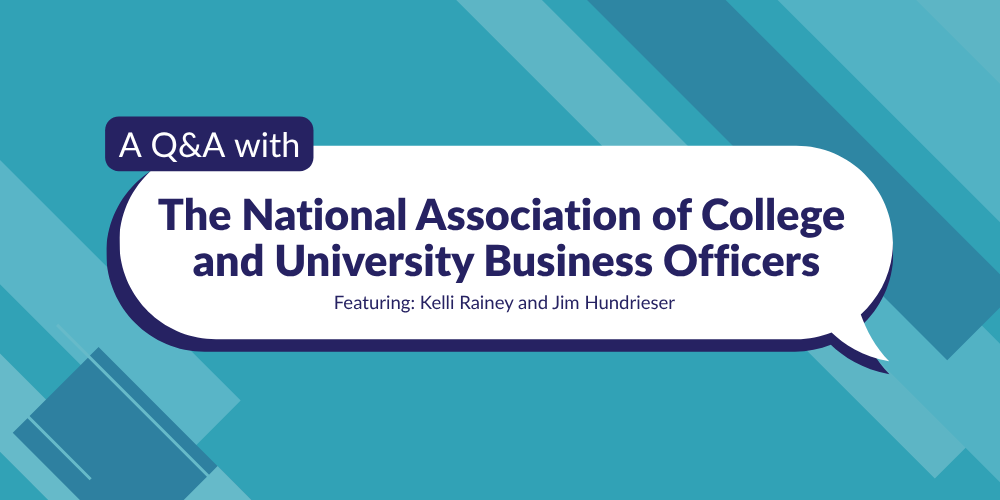College finance officers are central to student success efforts on campus and the National Association of College and University Business Officers (NACUBO) has been working for several years to bring them deeper into the student success conversation.
NACUBO provides resources, services, and advocacy support to the college business and finance officers that make up its 1,700-college membership. A few years ago, it received funding to help finance officers step up their strategic planning in support of student success and equitable outcomes, including building financial data systems and scaling more effective analysis and budgeting processes. The result was the NACUBO Student Success Hub. CCRC’s Nikki Edgecombe talked with NACUBO’s Kelli Rainey, senior director for student success initiatives, and Jim Hundrieser, senior advisor to the president, to learn more.
This Q&A was condensed and edited for clarity.
Nikki Edgecombe: Tell us a little bit about what this project is all about and what you wanted to achieve.
Jim Hundrieser: Originally our aim was to figure out: How are you strategically financing equitable student outcomes? What we learned, thanks to Kelli’s great leadership, was that many institutions didn’t have the data infrastructure they needed. They were investing in several programs but weren’t necessarily measuring how many students they were impacting. Or they had no idea how to move successful programs to scale. We finally got to the budgeting, the strategic ways in which you think about how to align finance with priorities, with a more student-focused lens.
Kelli Rainey: Our aim was to be able to deliver various toolkits to both members and non-members of NACUBO to support all of higher education to move the needle on those points that Jim just made.
And then our biggest piece was: How do you bring the chief business officer into the conversation around student success, where they are an active change agent in reform? I think that’s what makes this project really stand out.
Edgecombe: Tell us about the Student Success Hub. How did it evolve, and what is its use case for institutions?
Rainey: The hub is free resources that focus on the intersection between strategic finance and student success. We worked for three years with 26 institutions, doing some discovery with them to unpack their needs. In July 2024, at our annual meeting, we had our official release of the hub.
We provide toolkits that look at data governance and the structure of systems to understand how to strengthen knowledge management to better inform financial decisions. We look at how to build a budget that looks at scaling and sustainability and how to work with colleagues on new initiatives and talk about resource allocation. The toolkits help colleges to look from a student lens, where they examine and disaggregate information to understand how to better support certain populations of students.
Edgecombe: It sounds like the hub is democratizing and broadening the conversation around finance. Jim, can you talk about how the hub might be useful to community colleges in particular?
Hundrieser: There are a couple of tools I think are incredibly helpful. The first one is the IPEDS Peer Benchmarking Dashboards. We’ve developed a free tool for you to say, “Here are 10 of your peers. How do you compare?”
The second tool is the Financial Impact Analysis, to measure how much are you spending on initiatives and what is the return. For example, in New York State, the governor signed a bill saying community college will be free for all 25-to-45 year olds. Well, what are those costs? What are the resources being added? What’s the effectiveness? What’s your current completion rate? Where are you five years from now?
Rainey: One of the key things that we often get asked is, “Where do I start?” So, we built a Toolkit Finder, which is a quick assessment within the hub where you answer a few questions and it helps you figure out where you should start.
Edgecombe: Kelli, you talked about community colleges being part of the development of the hub resources. Were there particular needs that community colleges raised as the tools were being developed? What resources seemed particularly well suited to community colleges?
Rainey: We heard great feedback on the Budget Builder toolkit. Community colleges have limited resources, and they want to make sure that those resources are spent in ways that help move the needle—not only the strategic priorities of the institution but to jump start new scalable and sustainable opportunities. For example, Atlantic Cape Community College had a limited amount of money for special initiatives, and they were looking for strategies to best allocate it. They now had more intel on how to allocate those dollars, knowing all the things that go into building a true budget that supports a new initiative. The Budget Builder is designed to help you think through all those guiding components.
Edgecombe: We’re at a moment where community colleges and other higher ed institutions are facing a range of economic and policy uncertainties. How can NACUBO be a resource in this moment?
Hundrieser: We host regular Washington Update webinars, which are filled with information directed toward those in the finance area. There’s also advocacy support available.
Rainey: We are doing some specific things to support community colleges related to the Student Success Hub. We are hosting a learning workshop during our annual meeting at National Harbor this July. It’s focused specifically on community colleges and we actually do hands-on engagement. We plan to do more of those. And we’re currently working with CCBO, the Community College Business Officers conference, which will be held this fall, to do several workshops there. We’ve learned that the hands-on opportunities to engage with institutions are what move the needle on how to use these resources. And we have our own webinar series. All the recordings from those past webinars are posted on the hub site.
Edgecombe: Thank you. I’m thrilled to share this work. It feels like an important resource that more community colleges could use.





